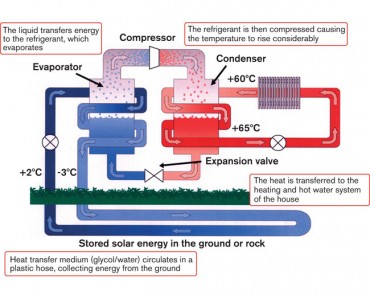Heat Pump Installation Enquiries
Interested in having a Heat Pump fitted at your property? Fill in our Heat-Pump Pre-Survey Questionnaire today, and one of our renewables surveyors will get back to you soon!
- Central heating and hot water
- Save on your energy bills
- Reduce your carbon emissions
- Government grants available
- Your home must be well insulated
- More attractive to homes off mains gas
Ground Source Heat Pumps let you use the natural heat energy in the ground to provide central heating and hot water for your home. They can help you to save on your energy bills and reduce your carbon emissions. Grants and incentives are also offered by the government to encourage their uptake.
A typical installation is electrically powered and consists of a collector buried in your garden connected to an inside unit. The collector extracts heat from the ground. This is then absorbed by a refrigeration circuit before being amplified and distributed to your home’s central heating and hot water systems.
Planning permission is not usually required but this should be checked with your local authority. Ground Source Heat Pumps are less likely to be an attractive choice for homes without a reasonably sized garden although a vertical (bore hole) collector can address this. See above
A key feature of a Ground Source Heat Pump is its ability to generate more energy to heat your home than is required to power its operation. Efficiencies of 250% can be observed with 1 kWh of electricity powering the pump generating 2.5 kWh of energy to heat your home.
A Ground Source Heat Pump is unlikely to be a good choice if your home isn’t well insulated. Good levels of roof, floor and wall insulation are desirable as are double glazed windows. Ground Source Heat Pumps also work better with low temperature central heating systems (e.g. oversized radiators)
Save on your energy bills
Installing a Ground Source Heat Pump can help you to reduce your monthly energy bills depending on your current system and the other alternatives available to you. Savings are more likely if you do not have access to mains gas. Savings are unlikely to be possible if your home is not well insulated.
The table below identifies the savings that the Energy Savings Trust suggested could be made by replacing an existing heating system with an average Ground Source Heat Pump in an average detached 4 bedroom home under the outgoing Domestic Renewable Heat Incentive Scheme*. Find out more about these figures.
| Existing System | Saving per year | RHI income per year* |
|---|---|---|
| Gas (Older non condensing) | £410 to £595 | £2,610 to £3,940 |
| Electric (Older non condensing) | £830 to £1,465 | £2,610 to £3,940 |
| Oil (Older non condensing) | £475 to £725 | £2,610 to £3,940 |
| LPG (Older non condensing) | £1,315 to £1,975 | £2,610 to £3,940 |
Government grants*
From 23 May 2022, you can apply for a one-off grant of up to £6000 towards the cost of installing any new ground-source heat pump whose installation commenced no earlier than 1 April 2022. This is under the terms of the government’s new Boiler Upgrade Scheme (BUS)*, which offers up to £6,000 as an incentive for ground-source heat pumps to homeowners who have first met the home insulation recommendations in an EPC report. Other eligibility criteria may apply; see here for details.
* The BUS scheme replaces the former Domestic Renewable Heat Incentive scheme. Successful applicants to the DRHI scheme before the deadline of March 31st, 2022 will remain eligible for payments under the scheme for seven years from the date of installation.
[Last updated April 12, 2022]




